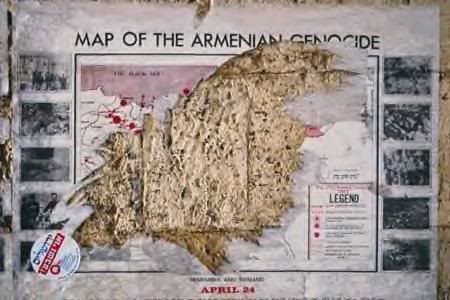I only have time to respond to quickly respond to your "calling out" the way I characterize Israel's actions regarding the Armenian Genocide.
I chose my words very carefully, as you might imagine. Why do I not call them out as denying the Genocide, rather I say that they do not officially acknowledge the Genocide? Because Turkey points to them and the U.S. as proof that there was no Genocide. Listen to Turkish arguments once in a while, and you'll note that one of their main defenses is that they are not the only deniers, that the U.S. and Israel support them in this denial, which they say gives their position credibility. But both those Turks and you are wrong. Israel does not "deny" the Armenian Genocide. They simply remain silent officially. And behind the scenes, AIPAC takes an active role in making sure that the U.S. does not acknowledge the Genocide, in essense, AIPAC denies the Genocide. This is a morally bankrupt and perverse policy, but it's done to appease the perpetrator of the crime, which is Israel's slavemaster in the middle east. So if I had said that Israel and the U.S. "deny" the Genocide, then that gives Turkey the right to say, hey, we're not the only deniers, the world's only superpower also denies it, and Israel, victims of a Holocaust, also denies it. And that's why I chose my words carefully, and I advise you to do the same.
I chose my words very carefully, as you might imagine. Why do I not call them out as denying the Genocide, rather I say that they do not officially acknowledge the Genocide? Because Turkey points to them and the U.S. as proof that there was no Genocide. Listen to Turkish arguments once in a while, and you'll note that one of their main defenses is that they are not the only deniers, that the U.S. and Israel support them in this denial, which they say gives their position credibility. But both those Turks and you are wrong. Israel does not "deny" the Armenian Genocide. They simply remain silent officially. And behind the scenes, AIPAC takes an active role in making sure that the U.S. does not acknowledge the Genocide, in essense, AIPAC denies the Genocide. This is a morally bankrupt and perverse policy, but it's done to appease the perpetrator of the crime, which is Israel's slavemaster in the middle east. So if I had said that Israel and the U.S. "deny" the Genocide, then that gives Turkey the right to say, hey, we're not the only deniers, the world's only superpower also denies it, and Israel, victims of a Holocaust, also denies it. And that's why I chose my words carefully, and I advise you to do the same.








Comment